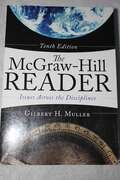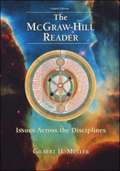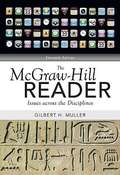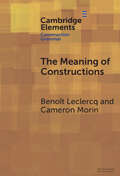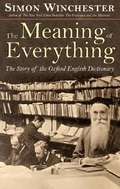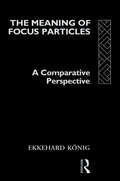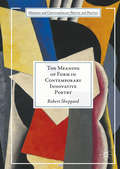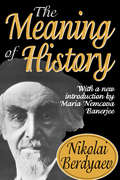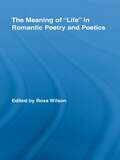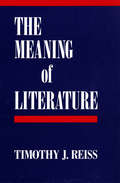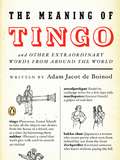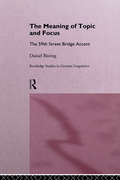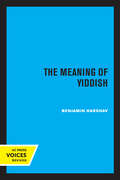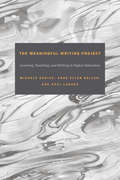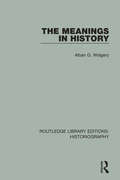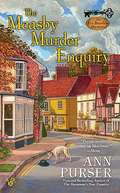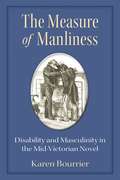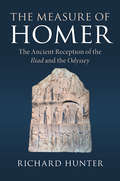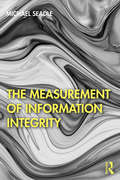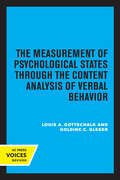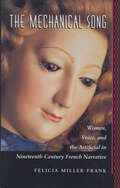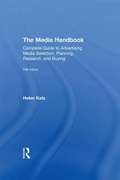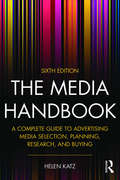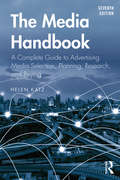- Table View
- List View
The McGraw-Hill Reader: Issues Across the Disciplines
by Gilbert H. MullerThe McGraw-Hill Reader addresses the liberal arts tradition, cross-curricular ideas, and diverse viewpoints through more than one hundred quality prose works from prominent writers and thinkers. A range of readings from both classic and contemporary sources and from across the disciplines―from education, the social sciences, business and economics, the humanities, and the sciences―provoke critical thought and effective writing.
The McGraw-Hill Reader: Issues Across the Disciplines Eighth Edition
by Gilbert H. MullerAddressing the continuing interest in liberal arts issues, interdisciplinary themes, multicultural perspectives, and critical thinking, The McGraw-Hill Reader provides students with a full range of quality prose works spanning various ages, cultures, and subjects.
The Mcgraw-Hill Reader: Issues Across the Disciplines (11th edition)
by Gilbert H. MullerThe McGraw-Hill Reader addresses the liberal arts tradition, cross-curricular ideas, and diverse viewpoints through more than one hundred quality prose works from prominent writers and thinkers. A range of readings from both classic and contemporary sources and from across the disciplines provoke critical thought and effective writing.
The Meaning of Constructions (Elements in Construction Grammar)
by Benoît Leclercq Cameron MorinThis Element offers a primer for the study of meaning in a Construction Grammar approach. It reviews the main principles of meaning shared across constructionist frameworks, including its ubiquity in grammatical structure, its usage-based formation, and its nature as the output of cognitive representations. It also reviews the importance given to meaning in construction-based explanations of sentence composition, innovative language use, and language change. Paradoxically, the Element shows that there is no systematic framework delineating the rich structure of constructional meaning, which has led to theoretical disagreements and inconsistencies. It therefore proposes an operational model of meaning for practitioners of Construction Grammar. It details the characteristics of a complex interface of semantic, pragmatic, and social meaning, and shows how this framework sheds light on recent theoretical issues. The Element concludes by considering ways in which this framework can be used for future descriptive and theoretical research questions.
The Meaning of Everything: The Story of the Oxford English Dictionary
by Simon WinchesterIt was on New Year's morning, 1928, that an eruption of mad lexical glee from a battered old typewriter on a desk in Baltimore from the hands of Henry Louis Mencken sent news all across the USA of the long-awaited publication of the book that was to crown the English language undisputed monarch of the linguistic kingdom. From the Oxford-based project a total of 414,825 words, ten times as many as had hitherto been suspected of existing, had now been recognized and catalogued, the results of seventy years of Herculean effort by scholars, linguists, and thousands of ordinary and not-so-ordinary people. "The Meaning of Everything" is a readily accessible historical account of the making of the remarkable Oxford English Dictionary, leading up to the appointment of the first editor, James Murray, in 1879 through to its triumphant publication in 1928 and beyond.
The Meaning of Focus Particles: A Comparative Perspective
by Ekkehard KönigFocus particles (words such as even, only, also) play an important role in English, in various syntactic and semantic domains, but their characteristics pose numerous problems for current syntactic frameworks and semantic theories. This book presents a comprehensive analysis of the syntax, meaning and use of focus particles and related function words in English and many other languages. It also provides a historical perspective on their development.
The Meaning of Form in Contemporary Innovative Poetry
by Robert SheppardThis study engages the life of form in contemporary innovative poetries through both an introduction to the latest theories and close readings of leading North American and British innovative poets. The critical approach derives from Robert Sheppard's axiomatic contention that poetry is the investigation of complex contemporary realities through the means (meanings) of form. Analyzing the poetry of Rosmarie Waldrop, Caroline Bergval, Sean Bonney, Barry MacSweeney, Veronica Forrest-Thomson, Kenneth Goldsmith, Allen Fisher, and Geraldine Monk, Sheppard argues that their forms are a matter of authorial design and readerly engagement.
The Meaning of History
by Daniel PipesIn her brilliant new opening essay, Banerjee says of Berdyaev "he was never more than a curious but unwelcome guest in history. He fearlessly engaged it on the level of ideas while remaining alien to its means and ends, gifted with an incurable longing for transcendence." Witness to two world wars, Berdyaev observed the destruction of established cultures in the traumatic birth of new systems. Arrested on political suspicion-by Czarist and then by Bolshevik police—he died in exile in France in 1948, carrying forth his intellectual work until the end.Berdyaev considered the philosophy of history as a field that laid the foundations of the Russian national consciousness. Its disputes were centered on distinctions between Slavophiles and Westerners, East and West. The Meaning of History was an early effort, following World War I, that attempted to revive this perspective. With the removal of Communism as a ruling system in Russia, that nation returned to an elaboration of a religious philosophy of history as the specific mission of Russian thought. This volume thus has contemporary significance. Its sense of the apocalypse, which distinguishes Russian from Western thought, gives the book its specifically religious character.In order to grasp and oppose the complex phenomenon of social and cultural disintegration, Berdyaev shows that human beings must rely upon some internal dialectic. After the debacle of the war, the moment arrived to integrate Russian historical experiences into those of a Europe, which, although torn by schism, still claimed to be the descendant of Christendom. The book is remarkable for its powerful stylistic grace, and astonishingly contemporary feeling.
The Meaning of Life in Romantic Poetry and Poetics (Routledge Studies in Romanticism)
by Ross WilsonThis volume brings together an impressive range of established and emerging scholars to investigate the meaning of ‘life’ in Romantic poetry and poetics. This investigation involves sustained attention to a set of challenging questions at the heart of British Romantic poetic practice and theory. Is poetry alive for the Romantic poets? If so, how? Does ‘life’ always mean ‘life’? In a range of essays from a variety of complementary perspectives, a number of major Romantic poets are examined in detail. The fate of Romantic conceptions of ‘life’ in later poetry also receives attention. Through, for examples, a revision of Blake’s relationship to so-called rationalism, a renewed examination of Wordsworth’s fascination with country graveyards, an exploration of Shelley’s concept of survival, and a discussion of the notions of ‘life’ in Byron, Kierkegaard, and Mozart, this volume opens up new and exciting terrain in Romantic poetry’s relation to literary theory, the history of philosophy, ethics, and aesthetics.
The Meaning of Literature
by Timothy J. ReissIn this searching and wide-ranging book, Timothy J. Reiss seeks to explain how the concept of literature that we accept today first took shape between the mid-sixteenth century and the early seventeenth, a time of cultural transformation. Drawing on literary, political, and philosophical texts from Central and Western Europe, Reiss maintains that by the early eighteenth century divergent views concerning gender, politics, science, taste, and the role of the writer had consolidated, and literature came to be regarded as an embodiment of universal values.During the second half of the sixteenth century, Reiss asserts, conceptual consensus was breaking down, and many Western Europeans found themselves overwhelmed by a sense of social decay. A key element of this feeling of catastrophe, Reiss points out, was the assumption that thought and letters could not affect worldly reality. Demonstrating that a political discourse replaced the no-longer-viable discourse of theology, he looks closely at the functions that letters served in the reestablishment of order. He traces the development of the idea of literature in texts by Montaigne, Spenser, Sidney, Shakespeare, Lope de Vega, and Cervantes, among others; through seventeenth-century writings by such authors as Davenant, Boileau, Dryden, Rymer, Anne Dacier, Astell, and Leibniz; to eighteenth-century works including those of Addison, Pope, Batteux and Hutcheson, Burke, Lessing, Kant, and Wollstonecraft. Reiss follows key strands of the tradition, particularly the concept of the sublime, into the nineteenth century through a reading of Hegel's Aesthetics.The Meaning of Literature will contribute to current debates concerning cultural dominance and multiculturalism. It will be welcomed by anyone interested in literature and in cultural studies, includingliterary theorists and historians, comparatists, intellectual historians, historical sociologists, and philosophers.
The Meaning of Meat and the Structure of the Odyssey
by Egbert J. BakkerThis comprehensive study of the Odyssey sees in meat and meat consumption a centre of gravitation for the interpretation of the poem. It aims to place the cultural practices represented in the poem against the background of the (agricultural) lived reality of the poem's audiences in the archaic age, and to align the themes of the adventures in Odysseus' wanderings with the events that transpire at Ithaca in the hero's absence. The criminal meat consumption of the suitors of Penelope in the civilised space of Ithaca is shown to resonate with the adventures of Odysseus and his companions in the pre-cultural worlds they are forced to visit. The book draws on folklore studies, the anthropology of hunting cultures, the comparative study of oral traditions, and the agricultural history of archaic and classical Greece. It will also be of interest to narratologists and students of folklore and Homeric poetics.
The Meaning of Tingo
by Adam Jacot de BoinodDid you know that people in Indonesia have a word that means 'to take off your clothes in order to dance'? Or how many words the Albanians have for eyebrows and moustaches? Or that the Dutch word for skimming stones is plimpplamppletteren? Drawing on the collective wisdom of over 154 languages, this intriguing book is arranged by theme so you can compare attitudes all over the world to such subjects as food, the human body and the battle of the sexes. Here you can find not only those words for which there is no direct counterpart in English (such as the Japanese age-otori which means looking less attractive after a haircut), but also a frank discussion of exactly how many 'Eskimo' terms there are for snow, and a vast array of information exploring the wonderful and often downright strange world of words. Oh, and tingo means 'to take all the objects one desires from the house of a friend, one at a time, by asking to borrow them'.
The Meaning of Topic and Focus: The 59th Street Bridge Accent (Routledge Studies in Germanic Linguistics)
by Daniel BüringThis study provides an illuminating and ground-breaking account of the complex interaction of intonational phenomena, semantics and pragmatics. Based on examples from German and English, and centred on an analysis of the fall-rise intonation contour, a semantic interpretation for two different pitch accents - Focus and Topic - is developed. The cross-sentence, as well as the sentence internal semantic effects of these accents, follow from the given treatment. The account is based on Montogovian possible world semantics and Chomskian generative syntax.
The Meaning of Yiddish
by Benjamin HarshavThis title is part of UC Press's Voices Revived program, which commemorates University of California Press’s mission to seek out and cultivate the brightest minds and give them voice, reach, and impact. Drawing on a backlist dating to 1893, Voices Revived makes high-quality, peer-reviewed scholarship accessible once again using print-on-demand technology. This title was originally published in 1990.
The Meaningful Writing Project: Learning, Teaching and Writing in Higher Education
by Anne Ellen Geller Michele Eodice Neal LernerIn the face of the continuing discourse of crisis in US education, The Meaningful Writing Project offers readers an affirming story of writing in higher education that shares students’ experiences in their own voices. In presenting the results of a three-year study consisting of surveys and interviews of university seniors and their faculty across three diverse institutions, authors Michele Eodice, Anne Ellen Geller, and Neal Lerner consider students’ perceptions of their meaningful writing experiences, the qualities of those experiences, and instructors’ perspectives on assignment design and delivery. This study confirms that meaningful assignments offer students opportunities to engage with instructors, peers, and texts and are relevant to past experiences and passions as well as to future aspirations and identities. Meaningful writing occurs across majors, in both required and elective courses, and beyond students’ years at college. Additionally, the study makes clear that faculty across the curriculum devote significant care and attention to creating writing assignments that support student learning, as they understand writing performance to be a developmental process connected to overall cognitive and social development, student engagement with learning, and success in a wide variety of disciplines and professions. The Meaningful Writing Project provides writing center directors, WPAs, other composition scholars, and all faculty interested in teaching and learning with writing an unprecedented look into the writing projects students find meaningful.
The Meanings in History (Routledge Library Editions: Historiography)
by Alban G. WidgeryIn this book, originally published in 1967, the author gives his views of history, from reflection on living history as distinct from books about past history. He sees histories as the related histories of individuals and gives an account of the meanings in those individuals’ lives and defends the beliefs dominatnly held in relation to them. He challenges professional historians to concern themselves with the fundamentals of history, and philosophers to return to the cnsideration of problems persistent in the previous history of philosophy, occidental and oriental.
The Measby Murder Enquiry
by Ann PurserCantankerous spinster Ivy Beasley has quickly learned that spending her golden years in the quaint village of Barrington won't be as quiet as she thought. Ivy hasn't been in assisted living at Springfields for long, but she's already found new friends, formed a detective agency, and solved a murder. And as autumn falls, Ivy and her team are asked to investigate a mysterious death in the village of Measby-in between card games, of course.
The Measure Of Manliness: Disability And Masculinity In The Mid-victorian Novel
by Karen BourrierThe Measure of Manliness is among the first books to focus on representations of disability in Victorian literature, showing that far from being marginalized or pathologized, disability was central to the narrative form of the mid-century novel. Mid-Victorian novels evidenced a proliferation of male characters with disabilities, a phenomenon that author Karen Bourrier sees as a response to the rise of a new Victorian culture of industry and vitality, and its corollary emphasis on a hardy, active manhood. The figure of the voluble, weak man was a necessary narrative complement to the silent, strong man. The disabled male embodied traditionally feminine virtues, softening the taciturn strong man, and eliciting emotional depths from his seemingly coarse muscular frame. Yet, the weak man was able to follow the strong man where female characters could not, to all-male arenas such as the warehouse and the public school. The analysis yokes together historical and narrative concerns, showing how developments in nineteenth-century masculinity led to a formal innovation in literature: the focalization or narration of the novel through the perspective of a weak or disabled man. The Measure of Manliness charts new territory in showing how feeling and loquacious bodies were increasingly seen as sick bodies throughout the nineteenth century. The book will appeal to those interested in disability studies, gender and masculinity studies, the theorization of sympathy and affect, the recovery of women's writing and popular fiction, the history of medicine and technology, and queer theory.
The Measure of Homer: The Ancient Reception Of The Iliad And The Odyssey
by Richard HunterHomer was the greatest and most influential Greek poet. In this book, Richard Hunter explores central themes in the poems’ reception in antiquity, paying particular attention to Homer’s importance in shaping ancient culture. Subjects include the geographical and educational breadth of Homeric reception, the literary and theological influence of Homer’s depiction of the gods, Homeric poetry and sympotic culture, scholarly and rhetorical approaches to Homer, Homer in the satires of Plutarch and Lucian, and how Homer shaped ideas about the power of music and song. This is a major and innovative contribution to the study of the dominant literary force in Greek culture and of the Greek literary engagement with the past. Through the study of their influence and reception, this book also sheds rich light on the Homeric poems themselves. All Greek and Latin are translated.
The Measurement of Information Integrity
by Michael SeadleArguing that there never was a time when politicians did not prevaricate and when some communities did not doubt conclusions that others considered to be facts, The Measurement of Information Integrity puts the post-truth era in context and offers measures for integrity in the modern world. Incorporating international examples from a range of disciplines, this book provides the reader with tools that will help them to evaluate public statements - especially ones involving the sciences and scholarship. It also provides intellectual tools to those who must assess potential violations of public or academic integrity. Many of these tools involve measurement mechanisms, ways of putting cases into context, and a recognition that few cases are simple black-and-white violations. Demonstrating that a binary approach to judging research integrity fails to recognize the complexity of the environment, Seadle highlights that even flawed discoveries may still contain value. Finally, the book reminds its reader that research integrity takes different forms in different disciplines and that each one needs separate consideration, even if the general principles remain the same for all. The Measurement of Information Integrity will help those who want to do research well, as well as those who must ascertain whether results have failed to meet the standards of the community. It will be of particular interest to researchers and students engaged in the study of library and information science.
The Measurement of Psychological States Through the Content Analysis of Verbal Behavior
by Louis A. Gottschalk Goldine C. GleserThis title is part of UC Press's Voices Revived program, which commemorates University of California Press’s mission to seek out and cultivate the brightest minds and give them voice, reach, and impact. Drawing on a backlist dating to 1893, Voices Revived makes high-quality, peer-reviewed scholarship accessible once again using print-on-demand technology. This title was originally published in 1969.
The Mechanical Song: Women, Voice, and the Artificial in Nineteenth-Century French Narrative
by Felicia Miller-FrankExamining the privileged relation of women to the singing voice in nineteenth-century literary works, the author argues for an emerging identification between women and artifice in the period. Beginning with texts by Rousseau and Proust that show a link between nostalgia for the maternal voice and the writer's self, the book then turns to the psychoanalytic literature on the role of the voice in the formation of the psyche. In the process, it analyses feminist polemics on the maternal voice to show how voice and rhythm together form the matrices of the subject. The voice of the soprano occupied a special place in nineteenth-century operatic history, replacing the castrato voice as a sexless, angelic, ethereal source of pleasure for the opera-goer. The author shows how these qualities are identified with women's voices in literary texts by Sand, Balzac, du Maurier and Nerval.
The Media Handbook: A Complete Guide to Advertising Media Selection, Planning, Research, and Buying
by Helen KatzThe Media Handbook provides a practical introduction to the advertising media planning and buying process. Emphasizing basic calculations along with the practical realities of offering alternatives and evaluating the plan, this fifth edition reflects the critical changes in how media is planned, bought, and sold by today's industry professionals. Author Helen Katz looks at the larger marketing, advertising, and media objectives, and follows with an exploration of major media categories, including digital media. She provides a comprehensive analysis of planning and buying, with a continued focus on how those tactical elements tie back to the strategic aims of the brand and client. Also available is a Companion Website that expands The Media Handbook's content in an online forum. Here, students and instructors can find tools to enhance course studies such as chapter overviews, PowerPoint slides, and sample questions. With its emphasis on real-world industry practice, The Media Handbook provides an essential introduction to students in advertising, media planning, communication, and marketing. It serves as an indispensable reference for anyone pursuing a career in media planning, buying, and research.
The Media Handbook: A Complete Guide to Advertising Media Selection, Planning, Research, and Buying (Lea’s Communication Series)
by Helen KatzThe Media Handbook provides a practical introduction to the advertising media planning and buying processes. Emphasizing basic calculations and the practical realities of offering alternatives and evaluating the plan, this sixth edition reflects the critical changes in how advertising in various media is planned, bought, and sold by today’s industry professionals. Author Helen Katz looks at the larger marketing, advertising, and media objectives, and follows with an exploration of major media categories, covering paid, owned, and earned media forms, including digital media. She provides a comprehensive analysis of planning and buying, with a continued focus on how those tactical elements tie back to the strategic aims of the brand and the client. Also available is a Companion Website that expands The Media Handbook’s content in an online forum. Here, students and instructors can find tools to enhance course studies such as chapter overviews, PowerPoint slides, and sample questions. With its emphasis on real-world industry practice, The Media Handbook provides an essential introduction to students in advertising, media planning, communication, and marketing. It serves as an indispensable reference for anyone pursuing a career in media planning, buying, and research.
The Media Handbook: A Complete Guide to Advertising Media Selection, Planning, Research, and Buying (Routledge Communication Series)
by Helen KatzThe Media Handbook provides a practical introduction to the advertising, media planning, and buying processes. Emphasizing basic calculations and the practical realities of offering alternatives and evaluating the plan, this seventh edition includes greater coverage of social media, buying automation, the continued digitization of media, and updated statistics on media consumption. It covers over the top television, programmatic TV, digital advertising, and the automation of buying across all media. Author Helen Katz provides a continued focus on how planning and buying tie back to the strategic aims of the brand and the client, keeping practitioners and students up to date with current industry examples and practices. The Companion Website to the book includes resources for both students and instructors. For students there are flashcards to test themselves on main concepts, a list of key media associations, a template flowchart and formulas. Instructors can find lecture slides and sample test questions to assist in their course preparation.
